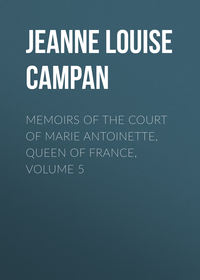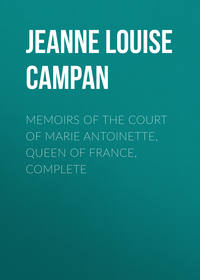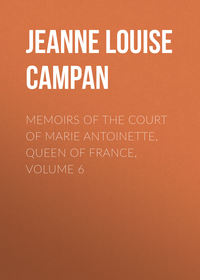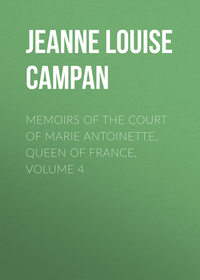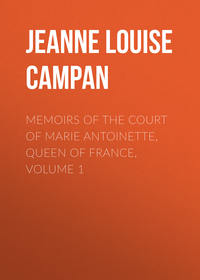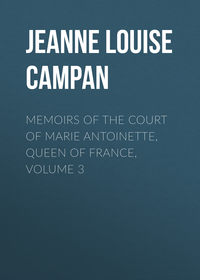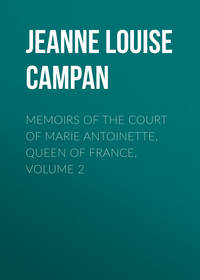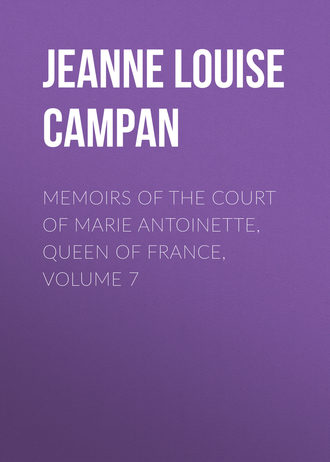 полная версия
полная версияMemoirs of the Court of Marie Antoinette, Queen of France, Volume 7
[The King's natural benevolence was constantly shown while in the Temple. His own dreadful position never prevented him from sympathy with the smaller troubles of others. A servant in the Temple named Marchand, the father of a family, was robbed of two hundred francs, —his wages for two months. The King observed his distress, asked its cause, and gave Clery the amount to be handed to Marchand, with a caution not to speak of it to any one, and, above all, not to thank the King, lest it should injure him with his employers.]
During his separation from his family the King refused to go into the garden. When it was proposed to him he said, "I cannot make up my mind to go out alone; the walk was agreeable to me only when I shared it with my family." But he did not allow himself to dwell on painful reflections. He talked freely to the municipals on guard, and surprised them by his varied and practical knowledge of their trades, and his interest in their domestic affairs. On the 19th December the King's breakfast was served as usual; but, being a fast-day, he refused to take anything. At dinner-time the King said to Clery, "Fourteen years ago you were up earlier than you were to-day; it is the day my daughter was born—today, her birthday," he repeated, with tears, "and to be prevented from seeing her!" Madame Royale had wished for a calendar; the King ordered Clery to buy her the "Almanac of the Republic," which had replaced the "Court Almanac," and ran through it, marking with a pencil many names.
"On Christmas Day," Says Clery, "the King wrote his will."
[Madame Royale says: "On the 26th December, St. Stephen's Day, my father made his will, because he expected to be assassinated that day on his way to the bar of the Convention. He went thither, nevertheless, with his usual calmness."—"Royal Memoirs," p. 196.]
On the 26th December, 1792, the King appeared a second time before the Convention. M. de Seze, labouring night and day, had completed his defence. The King insisted on excluding from it all that was too rhetorical, and confining it to the mere discussion of essential points.
[When the pathetic peroration of M, de Seze was read to the King, the evening before it was delivered to the Assembly, "I have to request of you," he said, "to make a painful sacrifice; strike out of your pleading the peroration. It is enough for me to appear before such judges, and show my entire innocence; I will not move their feelings.—"LACRETELLE.]
At half-past nine in the morning the whole armed force was in motion to conduct him from the Temple to the Feuillans, with the same precautions and in the same order as had been observed on the former occasion. Riding in the carriage of the Mayor, he conversed, on the way, with the same composure as usual, and talked of Seneca, of Livy, of the hospitals. Arrived at the Feuillans, he showed great anxiety for his defenders; he seated himself beside them in the Assembly, surveyed with great composure the benches where his accusers and his judges sat, seemed to examine their faces with the view of discovering the impression produced by the pleading of M. de Seze, and more than once conversed smilingly with Tronchet and Malesherbes. The Assembly received his defence in sullen silence, but without any tokens of disapprobation.
Being afterwards conducted to an adjoining room with his counsel, the King showed great anxiety about M. de Seze, who seemed fatigued by the long defence. While riding back to the Temple he conversed with his companions with the same serenity as he had shown on leaving it.
No sooner had the King left the hall of the Convention than a violent tumult arose there. Some were for opening the discussion. Others, complaining of the delays which postponed the decision of this process, demanded the vote immediately, remarking that in every court, after the accused had been heard, the judges proceed to give their opinion. Lanjuinais had from the commencement of the proceedings felt an indignation which his impetuous disposition no longer suffered him to repress. He darted to the tribune, and, amidst the cries excited by his presence, demanded the annulling of the proceedings altogether. He exclaimed that the days of ferocious men were gone by, that the Assembly ought not to be so dishonoured as to be made to sit in judgment on Louis XVI., that no authority in France had that right, and the Assembly in particular had no claim to it; that if it resolved to act as a political body, it could do no more than take measures of safety against the ci-devant King; but that if it was acting as a court of justice it was overstepping all principles, for it was subjecting the vanquished to be tried by the conquerors, since most of the present members had declared themselves the conspirators of the 10th of August. At the word "conspirators" a tremendous uproar arose on all aides. Cries of "Order!"—"To the Abbaye!"—"Down with the Tribune!" were heard. Lanjuinais strove in vain to justify the word "conspirators," saying that he meant it to be taken in a favourable sense, and that the 10th of August was a glorious conspiracy. He concluded by declaring that he would rather die a thousand deaths than condemn, contrary to all laws, even the most execrable of tyrants.
A great number of speakers followed, and the confusion continually increased. The members, determined not to hear any more, mingled together, formed groups, abused and threatened one another. After a tempest of an hour's duration, tranquillity was at last restored; and the Assembly, adopting the opinion of those who demanded the discussion on the trial of Louis XVI., declared that it was opened, and that it should be continued, to the exclusion of all other business, till sentence should be passed.
The discussion was accordingly resumed on the 27th, and there was a constant succession of speakers from the 28th to the 31st. Vergniaud at length ascended the tribune for the first time, and an extraordinary eagerness was manifested to hear the Girondists express their sentiments by the lips of their greatest orator.
The speech of Vergniaud produced a deep impression on all his hearers. Robespierre was thunderstruck by his earnest and, persuasive eloquence. Vergniaud, however, had but shaken, not convinced, the Assembly, which wavered between the two parties. Several members were successively heard, for and against the appeal to the people. Brissot, Gensonne, Petion, supported it in their turn. One speaker at length had a decisive influence on the question. Barere, by his suppleness, and his cold and evasive eloquence, was the model and oracle of the centre. He spoke at great length on the trial, reviewed it in all its bearings—of facts, of laws, and of policy—and furnished all those weak minds, who only wanted specious reasons for yielding, with motives for the condemnation of the King. From that moment the unfortunate King was condemned. The discussion lasted till the 7th, and nobody would listen any longer to the continual repetition of the same facts and arguments. It was therefore declared to be closed without opposition, but the proposal of a fresh adjournment excited a commotion among the most violent, and ended in a decree which fixed the 14th of January for putting the questions to the vote.
Meantime the King did not allow the torturing suspense to disturb his outward composure, or lessen his kindness to those around him. On the morning after his second appearance at the bar of the Convention, the commissary Vincent, who had undertaken secretly to convey to the Queen a copy of the King's printed defence, asked for something which had belonged to him, to treasure as a relic; the King took off his neck handkerchief and gave it him; his gloves he bestowed on another municipal, who had made the same request. "On January 1st," says Clery, "I approached the King's bed and asked permission to offer him my warmest prayers for the end of his misfortunes. 'I accept your good wishes with affection,' he replied, extending his hand to me. As soon as he had risen, he requested a municipal to go and inquire for his family, and present them his good wishes for the new year. The officers were moved by the tone in which these words, so heartrending considering the position of the King, were pronounced . . . . The correspondence between their Majesties went on constantly. The King being informed that Madame Royale was ill, was very uneasy for some days. The Queen, after begging earnestly, obtained permission for M. Brunnier, the medical attendant of the royal children, to come to the Temple. This seemed to quiet him."
The nearer the moment which was to decide the King's fate approached, the greater became the agitation in, Paris. "A report was circulated that the atrocities of September were to be repeated there, and the prisoners and their relatives beset the deputies with supplications that they would snatch them from destruction. The Jacobins, on their part, alleged that conspiracies were hatching in all quarters to save Louis XVI. from punishment, and to restore royalty. Their anger, excited by delays and obstacles, assumed a more threatening aspect; and the two parties thus alarmed one another by supposing that each harboured sinister designs."
On the 14th of January the Convention called for the order of the day, being the final judgment of Louis XVI.
"The sitting of the Convention which concluded the trial," says Hazlitt, "lasted seventy-two hours. It might naturally be supposed that silence, restraint, a sort of religious awe, would have pervaded the scene. On the contrary, everything bore the marks of gaiety, dissipation, and the most grotesque confusion. The farther end of the hall was converted into boxes, where ladies, in a studied deshabille, swallowed ices, oranges, liqueurs, and received the salutations of the members who went and came, as on ordinary occasions. Here the doorkeepers on the Mountain side opened and shut the boxes reserved for the mistresses of the Duc d'Orleans; and there, though every sound of approbation or disapprobation was strictly forbidden, you heard the long and indignant 'Ha, ha's!' of the mother-duchess, the patroness of the bands of female Jacobins, whenever her ears were not loudly greeted with the welcome sounds of death. The upper gallery, reserved for the people, was during the whole trial constantly full of strangers of every description, drinking wine as in a tavern.
"Bets were made as to the issue of the trial in all the neighbouring coffee-houses. Ennui, impatience, disgust sat on almost every countenance. The figures passing and repassing, rendered more ghastly by the pallid lights, and who in a slow, sepulchral voice pronounced only the word—Death; others calculating if they should have time to go to dinner before they gave their verdict; women pricking cards with pins in order to count the votes; some of the deputies fallen asleep, and only waking up to give their sentence,—all this had the appearance rather of a hideous dream than of a reality."
The Duc d'Orleans, when called on to give his vote for the death of his King and relation, walked with a faltering step, and a face paler than death itself, to the appointed place, and there read these words: "Exclusively governed by my duty, and convinced that all those who have resisted the sovereignty of the people deserve death, my vote is for death!" Important as the accession of the first Prince of the blood was to the Terrorist faction, his conduct in this instance was too obviously selfish and atrocious not to excite a general feeling of indignation; the agitation of the Assembly became extreme; it seemed as if by this single vote the fate of the monarch was irrevocably sealed.
The President having examined the register, the result of the scrutiny was proclaimed as follows
Against an appeal to the people……….. 480
For an appeal to the people…………… 283
Majority for final judgment…………… 197
The President having announced that he was about to declare the result of the scrutiny, a profound silence ensued, and he then gave in the following declaration: that, out of 719 votes, 366 were for DEATH, 319 were for imprisonment during the war, two for perpetual imprisonment, eight for a suspension of the execution of the sentence of death until after the expulsion of the family of the Bourbons, twenty-three were for not putting him to death until the French territory was invaded by any foreign power, and one was for a sentence of death, but with power of commutation of the punishment.
After this enumeration the President took off his hat, and, lowering his voice, said: "In consequence of this expression of opinion I declare that the punishment pronounced by the National Convention against Louis Capet is DEATH!"
Previous to the passing of the sentence the President announced on the part of the Foreign Minister the receipt of a letter from the Spanish Minister relative to that sentence. The Convention, however, refused to hear it. [It will be remembered that a similar remonstrance was forwarded by the English Government.]
M. de Malesherbes, according to his promise to the King, went to the
Temple at nine o'clock on the morning of the 17th?.
[Louis was fully prepared for his fate. During the calling of the votes he asked M. de Malesherbes, "Have you not met near the Temple the White Lady?"—" What do you mean?" replied he. "Do you not know," resumed the King with a smile, "that when a prince of our house is about to die, a female dressed in white is seen wandering about the palace? My friends," added he to his defenders, "I am about to depart before you for the land of the just, but there, at least, we shall be reunited." In fact, his Majesty's only apprehension seemed to be for his family.—ALISON.]
"All is lost," he said to Clery. "The King is condemned." The King, who saw him arrive, rose to receive him.
[When M. de Malesherbes went to the Temple to announce the result of the vote, he found Louis with his forehead resting on his hands, and absorbed in a deep reverie. Without inquiring concerning his fate, he said: "For two hours I have been considering whether, during my whole reign, I have voluntarily given any cause of complaint to my subjects; and with perfect sincerity I declare that I deserve no reproach at their hands, and that I have never formed a wish but for their happiness." LACRETELLE.]
M. de Malesherbes, choked by sobs, threw himself at his feet. The King raised him up and affectionately embraced him. When he could control his voice, De Malesherbes informed the King of the decree sentencing him to death; he made no movement of surprise or emotion, but seemed only affected by the distress of his advocate, whom he tried to comfort.
On the 20th of January, at two in the afternoon, Louis XVI. was awaiting his advocates, when he heard the approach of a numerous party. He stopped with dignity at the door of his apartment, apparently unmoved: Garat then told him sorrowfully that he was commissioned to communicate to him the decrees of the Convention. Grouvelle, secretary of the Executive Council, read them to him. The first declared Louis XVI. guilty of treason against the general safety of the State; the second condemned him to death; the third rejected any appeal to the people; and the fourth and last ordered his execution in twenty-four hours. Louis, looking calmly round, took the paper from Grouvelle, and read Garat a letter, in which he demanded from the Convention three days to prepare for death, a confessor to assist him in his last moments, liberty to see his family, and permission for them to leave France. Garat took the letter, promising to submit it immediately to the Convention.
Louis XVI. then went back into his room with great composure, ordered his dinner, and ate as usual. There were no knives on the table, and his attendants refused to let him have any. "Do they think me so cowardly," he exclaimed, "as to lay violent hands on myself? I am innocent, and I am not afraid to die."
The Convention refused the delay, but granted some other demands which he had made. Garat sent for Edgeworth de Firmont, the ecclesiastic whom Louis XVI. had chosen, and took him in his own carriage to the Temple. M. Edgeworth, on being ushered into the presence of the King, would have thrown himself at his feet, but Louis instantly raised him, and both shed tears of emotion. He then, with eager curiosity, asked various questions concerning the clergy of France, several bishops, and particularly the Archbishop of Paris, requesting him to assure the latter that he died faithfully attached to his communion.—The clock having struck eight, he rose, begged M. Edgeworth to wait, and retired with emotion, saying that he was going to see his family. The municipal officers, unwilling to lose sight of the King, even while with his family, had decided that he should see them in the dining-room, which had a glass door, through which they could watch all his motions without hearing what he said. At half-past eight the door opened. The Queen, holding the Dauphin by the hand, Madame Elisabeth, and Madame Royale rushed sobbing into the arms of Louis XVI. The door was closed, and the municipal officers, Clery, and M. Edgeworth placed themselves behind it. During the first moments, it was but a scene of confusion and despair. Cries and lamentations prevented those who were on the watch from distinguishing anything. At length the conversation became more calm, and the Princesses, still holding the King clasped in their arms, spoke with him in a low tone. "He related his trial to my mother," says Madame Royale, "apologising for the wretches who had condemned him. He told her that he would not consent to any attempt to save him, which might excite disturbance in the country. He then gave my brother some religious advice, and desired him, above all, to forgive those who caused his death; and he gave us his blessing. My mother was very desirous that the whole family should pass the night with my father, but he opposed this, observing to her that he much needed some hours of repose and quiet." After a long conversation, interrupted by silence and grief, the King put an end to the painful meeting, agreeing to see his family again at eight the next morning. "Do you promise that you will?" earnestly inquired the Princesses. "Yes, yes," sorrowfully replied the King.
["But when we were gone," says his daughter, "he requested that we might not be permitted to return, as our presence afflicted him too much."]
At this moment the Queen held him by one arm, Madame Elisabeth by the other, while Madame Royale clasped him round the waist, and the Dauphin stood before him, with one hand in that of his mother. At the moment of retiring Madame Royale fainted; she was carried away, and the King returned to M. Edgeworth deeply depressed by this painful interview. The King retired to rest about midnight; M. Edgeworth threw himself upon a bed, and Clery took his place near the pillow of his master.
Next morning, the 21st of January, at five, the King awoke, called Clery, and dressed with great calmness. He congratulated himself on having recovered his strength by sleep. Clery kindled a fire,, and moved a chest of drawers, out of which he formed an altar. M. Edgeworth put on his pontifical robes, and began to celebrate mass. Clery waited on him, and the King listened, kneeling with the greatest devotion. He then received the communion from the hands of M. Edgeworth, and after mass rose with new vigour, and awaited with composure the moment for going to the scaffold. He asked for scissors that Clery might cut his hair; but the Commune refused to trust him with a pair.
At this moment the drums were beating in the capital. All who belonged to the armed sections repaired to their company with complete submission. It was reported that four or five hundred devoted men, were to make a dash upon the carriage, and rescue the King. The Convention, the Commune, the Executive Council, and the Jacobins were sitting. At eight. in the morning, Santerre, with a deputation from the Commune, the department, and the criminal tribunal, repaired to the Temple. Louis XVI., on hearing them arrive, rose and prepared to depart. He desired Clery to transmit his last farewell to his wife, his sister, and his children; he gave him a sealed packet, hair, and various trinkets, with directions to deliver these articles to them.
[In the course of the morning the King said to me: "You will give this seal to my son and this ring to the Queen, and assure her that it is with pain I part with it. This little packet contains the hair of all my family; you will give her that, too. Tell the Queen, my dear sister, and my children, that, although I promised to see them again this morning, I have resolved to spare them the pang of so cruel a separation. Tell them how much it costs me to go away without receiving their embraces once more!" He wiped away some tears, and then added, in the most mournful accents, "I charge you to bear them my last farewell."—CLERY.]
He then clasped his hand and thanked him for his services. After this he addressed himself to one of the municipal officers, requesting him to transmit his last will to the Commune. This officer, who had formerly been a priest, and was named Jacques Roux, brutally replied that his business was to conduct him to execution, and not to perform his commissions. Another person took charge of it, and Louis, turning towards the party, gave with firmness the signal for starting.
Officers of gendarmerie were placed on the front seat of the carriage. The King and M. Edgeworth occupied the back. During the ride, which was rather long, the King read in M. Edgeworth's breviary the prayers for persons at the point of death; the two gendarmes were astonished at his piety and tranquil resignation. The vehicle advanced slowly, and amidst universal silence. At the Place de la Revolution an extensive space had been left vacant about the scaffold. Around this space were planted cannon; the most violent of the Federalists were stationed about the scaffold; and the vile rabble, always ready to insult genius, virtue, and misfortune, when a signal is given it to do so, crowded behind the ranks of the Federalists, and alone manifested some outward tokens of satisfaction.
At ten minutes past ten the carriage stopped. Louis XVI., rising briskly, stepped out into the Place. Three executioners came up; he refused their assistance, and took off his clothes himself. But, perceiving that they were going to bind his hands, he made a movement of indignation, and seemed ready to resist. M. Edgeworth gave him a last look, and said, "Suffer this outrage, as a last resemblance to that God who is about to be your reward." At these words the King suffered himself to be bound and conducted to the scaffold. All at once Louis hurriedly advanced to address the people. "Frenchmen," said he, in a firm voice, "I die innocent of the crimes which are imputed to me; I forgive the authors of my death, and I pray that my blood may not fall upon France." He would have continued, but the drums were instantly ordered to beat: their rolling drowned his voice; the executioners laid hold of him, and M. Edgeworth took his leave in these memorable words: "Son of Saint Louis, ascend to heaven!" As soon as the blood flowed, furious wretches dipped their pikes and handkerchiefs in it, then dispersed throughout Paris, shouting "Vive la Republique! Vive la Nation!" and even went to the gates of the Temple to display brutal and factious joy.
[The body of Louis was, immediately after the execution, removed to the ancient cemetery of the Madeleine. Large quantities of quicklime were thrown into the grave, which occasioned so rapid a decomposition that, when his remains were sought for in 1816, it was with difficulty any part could be recovered. Over the spot where he was interred Napoleon commenced the splendid Temple of Glory, after the battle of Jena; and the superb edifice was completed by the Bourbons, and now forms the Church of the Madeleine, the most beautiful structure in Paris. Louis was executed on the same ground where the Queen, Madame Elisabeth, and so many other noble victims of the Revolution perished; where Robespierre and Danton afterwards suffered; and where the Emperor Alexander and the allied sovereigns took their station, when their victorious troops entered Paris in 1814! The history of modern Europe has not a scene fraught with equally interesting recollections to exhibit. It is now marked by the colossal obelisk of blood-red granite which was brought from Thebes, in Upper Egypt, in 1833, by the French Government.—ALLISON.]


